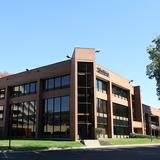- Montgomery College’s small class sizes, faculty dedicated to teaching and learning, and affordable tuition make us a popular choice for numerous county residents. We’re very proud of the fact that we transfer nearly 5,000 students a year to colleges and universities close to home and across the country. And Montgomery College is a major provider of teachers, nurses, biotechnicians, and other high demand professions in Montgomery County, Maryland.
School Highlights
Montgomery College serves 24,105 students (26% of students are full-time).
The college's student-teacher ratio of 11:1 is lower than the state community college average of 12:1.
Minority enrollment is 78% of the student body (majority Black and Hispanic), which is more than the state average of 63%.
Quick Facts (2025-26)
- Enrollment: 24,105 students
- In-state tuition: $8,910
- Out-state tuition: $12,078
- Acceptance Rate: 50%
- Student-teacher ratio: 11:1
- Minority enrollment: 78%
- Source: Integrated Postsecondary Education Data System (IPEDS)
Top Rankings
Montgomery College ranks among the top 20% of public schools in Maryland for:
Category
Attribute
Selectivity
Diversity
Community Size
School Overview
The teacher population of 2,185 teachers has stayed relatively flat over five years.
Montgomery College
(MD) Community College Avg.
Carnegie Classification
Associate's Colleges: High Transfer-Mixed Traditional/Nontraditional
Associate's Colleges: High Transfer-Mixed Traditional/Nontraditional
Institution Level
At least 2 but less than 4 years
At least 2 but less than 4 years
Institution Control
Public
Public
Total Faculty
2,185 staff
446 staff
School Calendar
Student Body
The student population of Montgomery College has grown by 13% over five years.
The student-teacher ratio of 11:1 has increased from 9:1 over five years.
The Montgomery College diversity score of 0.79 is more than the state average of 0.75. The school's diversity has stayed relatively flat over five years.
Total Enrollment
24,105 students
5,610 students
Student-Teacher Ratio
11:1
12:1
# Full-Time Students
6,312 students
1,128 students
# Part-Time Students
17,793 students
4,482 students
# Enrollment Undergraduate
241 students
319 students
# Full-Time Undergraduate Students
6,312 students
1,128 students
# Part-Time Undergraduate Students
17,793 students
4,482 students
% American Indian/Alaskan
n/a
n/a
% Asian
13%
7%
% Hispanic
25%
13%
% Black
26%
30%
% White
22%
37%
% Hawaiian
n/a
n/a
% Two or more races
4%
5%
% Non Resident races
10%
5%
% Unknown races
n/a
3%
Diversity Score
0.79
0.75
College Completion Rate (Students who graduate in less than 4 years)
28%
28%
Average Graduate Earnings (10 Years)
$44,200
$36,700
Tuition and Acceptance Rate
The public in-state tuition of $8,910 is more than the state average of $5,633. The in-state tuition has declined by 13% over four years.
The public out-state tuition of $12,078 is more than the state average of $7,892. The out-state tuition has declined by 13% over four years.
In-State Tuition Fees
$8,910
$5,633
Out-State Tuition Fees
$12,078
$7,892
% Students Receiving Some Financial Aid
59%
72%
Median Debt for Graduates
$10,000
$10,000
Median Debt for Dropouts
$7,000
$5,500
Acceptance Rate
50%
100%
Source: 2024 (or latest year available) Integrated Postsecondary Education Data System (IPEDS)
School Notes
- On September 16, 1946, the first Montgomery College classes were held in the evenings at a local high school with a student body of 186 men and women. Over the past half-century the College has grown to a multicampus institution with more than 20,000 credit students and 15,000 Continuing Education students. By the fall of 1950, the College had acquired the buildings and seven acres previously occupied by the Bliss Electrical Society. This new home in Takoma Park became the first campus of Montgomery College. A second campus, the Rockville Campus, opened in September 1965. The Germantown Campus opened in September 1975 with classes held temporarily in Seneca Valley High School. Since the fall of 1978, the Germantown Campus has been located in permanent college facilities in Germantown, Maryland. Opened in 1965 with an enrollment of 2,489, the Rockville Campus is now Montgomery College's largest, with an enrollment of 14,000 full- and part-time students. It is located just north of Washington, D.C., between Route 355 and Interstate 270, and is readily accessible by bus and the Metro rail system. More than 600 courses are now offered in more than 40 curricula. People of all ages take classes at Rockville, and there is a diverse mix of cultures which contribute to the international flavor of this suburban campus. Thousands of Continuing Education students also attend classes at Rockville, and additional tens of thousands of people come to this campus each year for art exhibitions, athletic events, concerts, conferences, lectures, movies, plays, and other events open to the public. Under the leadership of the Instructional Deans, the campus is comprised of seven major instructional areas; Business, Hospitality Management and Information Science, Fine, Performing and Visual Arts, Humanities, Science, Engineering and Mathematics, Social Science, History, Education, Health and Physical Education, the Applied Technology & Gudelsky Institute for Technical Education, and Student Development. Each area is led by a dean. Leadership for The Arts Institute, the Paul Peck Humanities Institute and the Montgomery County Public Schools Partnerships is provided by a program director. Intercollegiate athletics for men and women are a part of the total offering of the College. The College belongs to the National Junior College Athletic Association (NJCAA); Region XX NJCAA; and the Maryland Junior College Athletic Association, known as JUCO. The campuses field teams in numerous men's and women's intercollegiate sports.
Frequently Asked Questions
How much does Montgomery College cost?
Montgomery College's tuition is approximately $8,910 for In-State students and $12,078 for Out-State students.
What is the acceptance rate of Montgomery College?
The acceptance rate of Montgomery College is 50%, which is lower than the state average of 100%. Montgomery College's acceptance rate is ranked among the top community colleges in Maryland with low acceptance rates.
What is Montgomery College's ranking?
Montgomery College ranks among the top 20% of community college in Maryland for: Lowest acceptance rates, Diversity in US community colleges and Largest student body.
Recent Articles

Community College Success Rates 2025: Outcomes & Trends
Updated 2025 analysis of community college success rates, completion, transfer, costs, enrollment, and strategies that shape student outcomes.

Community Colleges in 2025: Combating Stereotypes with Impact
Updated insights on how community colleges are dispelling myths, growing enrollment, and expanding pathways in 2025.

2025 FAFSA Changes Explained for Community College Students
A comprehensive guide to 2025 FAFSA changes, what community college students must know, new eligibility rules, timelines, and tips to maximize federal aid.










